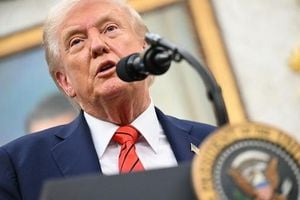On March 7, 2025, President Donald Trump took significant steps to reshape the Public Service Loan Forgiveness (PSLF) program, signing an executive order aimed at limiting the eligibility of borrowers and employers participating in this pivotal student debt relief mechanism. The new restrictions, which are aligned with the current administration's political agenda, primarily target organizations engaged with immigrant advocacy, the transgender community, and groups supportive of Palestinian rights.
Aaron Reichlin-Melnick, a legal expert with the American Immigration Council, criticized the executive order, stating, "This is shockingly unlawful and a clear First Amendment violation. The PSLF program provides the president no authority to restrict it to only those people who work for nonprofits whose work he supports. Expect lawsuits within short periods of time." This sentiment encapsulates the mounting legal challenges anticipated as borrowers and advocacy groups prepare to voice opposition.
Echoing the growing concerns over student debt, data from VantageScore revealed alarming figures: approximately 9 million borrowers are currently behind on their payments, accounting for over 40% of those with dues. Rikard Bandebo, chief economist at VantageScore, noted concerning trends surrounding credit scores connected to student loan delinquencies. "Someone who has a high [credit] score, let's say they have a VantageScore super prime score of like 800, they could see their score drop by as much as 129 points," Bandebo explained. He added, "A credit score ... takes a long time to build, but it can fall very quickly. So, a delinquency — like a student loan delinquency — will sit on the file for seven years. It takes a long time to repair this."
On March 10, 2025, Democratic lawmakers led by Senator Elizabeth Warren sent a letter to Education Secretary Linda McMahon, emphasizing collaboration on student-loan servicer oversight, particularly concerning MOHELA. Notably, MOHELA currently manages accounts for over 7 million borrowers, yet it has recently been labeled the worst-performing servicer based on key performance metrics like customer satisfaction and call wait times.
Data released by the Department of Education showed MOHELA took, on average, nearly three minutes to answer calls, which is approximately 12 times longer than newer federal servicer Central Research, Inc. Its average call abandon rate was recorded at 7.37%, compared to Nelnet’s significantly lower rate of 0.76% and Central Research’s 1.33%. These metrics lay bare the urgent need for action alongside the sentiment expressed by lawmakers who called for accountability measures: "If MOHELA does not clean up its act, ED should also Consider terminating its contract with the servicer," they urged.
MOHELA has faced scrutiny before; the Education Department previously found it at fault for failing to send timely billing statements to 2.5 million borrowers, which led to over $7 million being withheld from its payments as punitive action. Now, as Secretary McMahon steps up to the challenge, her first task will coincide with promises made during her confirmation hearings to improve the efficacy of loan servicers.
Adding to the complexity of the situation, the Trump administration aims to dismantle the U.S. Department of Education altogether, necessitating the transfer of over 40 million borrowers' accounts to alternative agencies. During early March 2025, Trump proposed moving the oversight of loans to the Treasury Department, Commerce Department, or Small Business Administration, making it clear he believes the Education Department should not manage student loans.
Trump remarked, "I don't think the Education [Department] should be handling the loans. That's not their business." His administration's proposed shake-up raises questions about potential disruptions to the already troubled student lending system. Experts warn these transfers might exacerbate existing issues, as many borrowers report difficulties with inaccurate billing, inadequate communication with servicers, and complications surrounding loan forgiveness applications.
Michele Shepard Zampini, the senior director of college affordability at The Institute for College Access and Success, commented on the risks involved. "Borrowers and students need more stability, and this would create chaos," she argued. She pointed out the inevitable confusion among borrowers during the transfer process, which could span several months.
Despite this shake-up, higher education expert Mark Kantrowitz reassured borrowers, stating, "The terms and conditions of your federal student loans will not change even if the agency overseeing them does." He emphasized the rights guaranteed to borrowers under their original agreements remain intact.
The education sector continuously grapples with the pressing challenges posed by student debt. While the Biden administration had earlier laid out frameworks for holding servicers accountable, the new direction taken by Trump's administration appears to complicate efforts to provide relief to borrowers. The fate of the PSLF program and the handling of federal student loans rests precariously on how these various political forces converge.
With these developments, students, recent graduates, and advocates are ready to respond. The repercussions of Trump’s executive order and proposed changes to the federal student loan system could be far-reaching, leading many to prepare for legal challenges and political actions. How the administration will negotiate these changes remains uncertain, but the impact on millions of borrowers is imminent.



